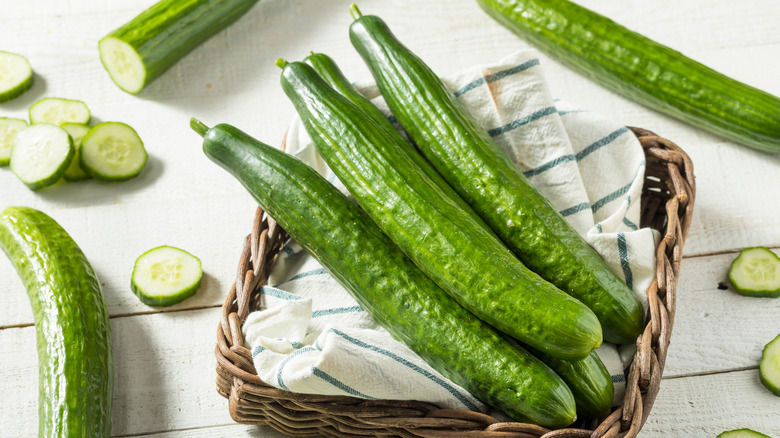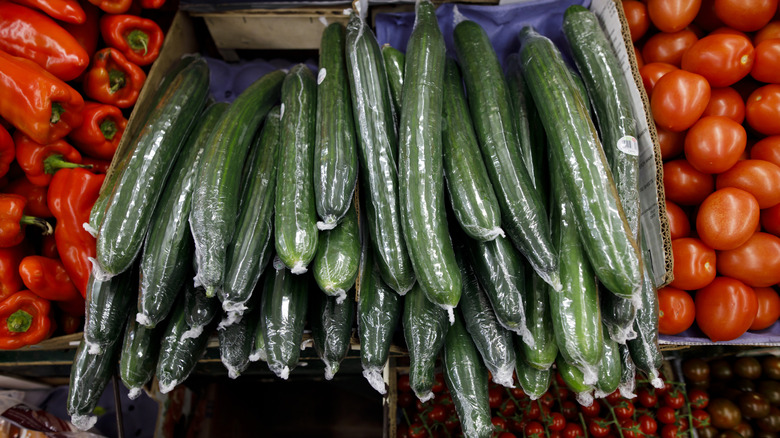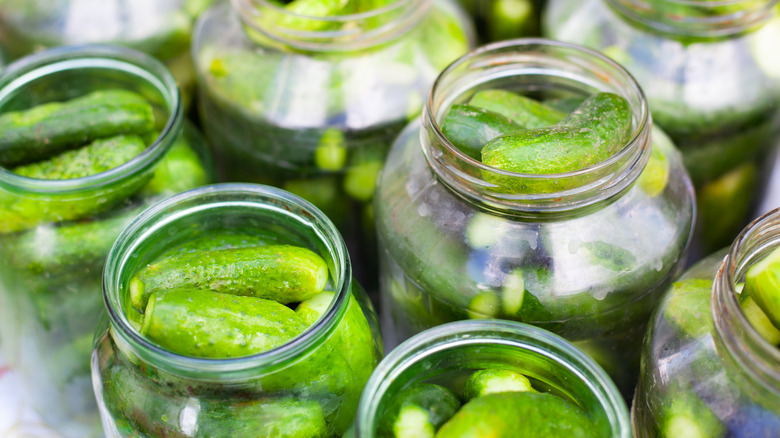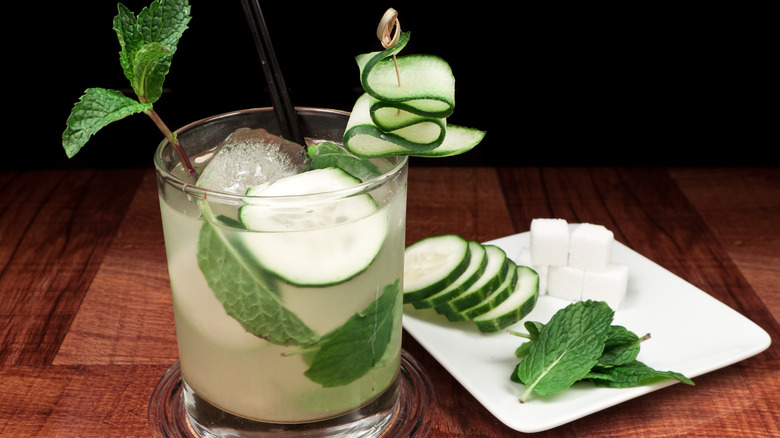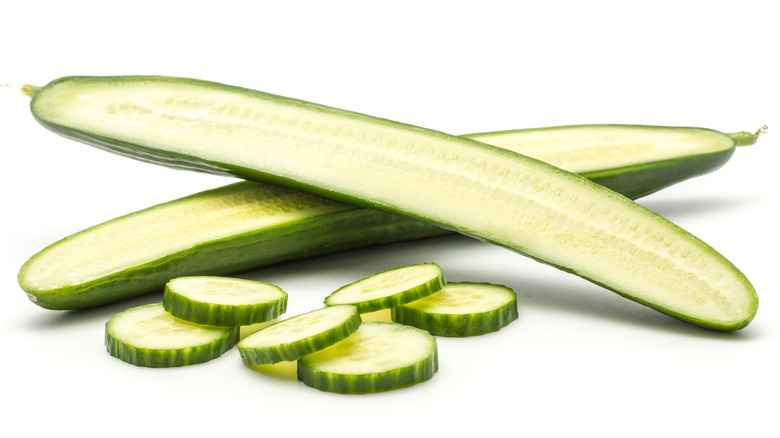What Makes English Cucumbers Different?
Some cucumber varieties are ideal for salads, others are perfect for pickling, and outside of the kitchen, you can even slice them up and put them over your eyes for some au naturale skincare. For a vegetable that's never actually cooked, cucumbers are an incredibly versatile ingredient. After all, what would tzatziki sauce be without cucumbers, or a Rueben sandwich without the pickle on the side? The refreshing crunch of a cucumber can truly make or break a dish, so if your recipe calls for a specific type, it's best not to make any substitutions.
At the grocery store, you've probably seen both the "regular" garden cucumbers, as well as the more expensive English cucumbers. But despite the fact that these varieties are both long and green, cucumbers are not always interchangeable. There are also Armenian cucumbers, Persian cucumbers, Kirby cucumbers, gherkins — the list goes on (via The Spruce Eats). Yet none of these varieties are quite like the English cucumber.
English cucumbers are always sold in shrink-wrap
If you see a cucumber wrapped in plastic, that's a surefire way to tell it's an English cucumber. Because English cucumbers have thinner, softer skin compared to other varieties of the vegetable, they require a bit of extra protection, Taste of Home says. The shrink-wrapped plastic ensures the cucumbers stay as fresh as possible, while also helping to minimize any bruising or drying out that might occur while being transported to grocery stores. For this reason, the only time you'd find English cucumbers without the plastic shrink-wrap is if you're buying them directly from a farmers market, The Spruce Eats says. Otherwise, English cucumbers are the only variety that require such a covering. Other types have thick enough skin to do without it, and instead are coated in a thin layer of wax. Contrary to popular belief, the purpose of this wax is to keep the cucumber from drying out, meaning it works the same as the plastic does for English cucumbers.
English cucumbers are not ideal for pickling
The most basic pickle recipe requires only cucumbers, vinegar, and dill. Stick it all in a jar, let it sit, and in due time you'll have yourself some pickles. The process may be simple, but that doesn't mean it's foolproof. Use the wrong type of cucumbers — English cucumbers, to be specific — and your pickles won't turn out the way you expect.
According to Bon Appétit, English cucumbers don't pickle well because of how skinny they are and how thin their skin is. Considering English cucumbers are so delicate that they need to be covered in plastic at the grocery store, it makes sense that they're no match for an acidic bath of concentrated vinegar. Therefore, as Bon Appétit explains, the best kind of cucumber to use is one that's thick all around, such as the Kirby variety. Because Kirby cucumbers aren't nearly as thin or skinny as English cucumbers, they make for pickles that are crisp and crunchy when you bite into them, rather than soft and mushy.
English cucumbers can be used in cocktails
Aside from the tomato juice in a Bloody Mary, or the olive juice in a dirty martini, most vegetables don't typically go well with cocktails unless in the form of juice. English cucumbers, however, are a naturally complementary flavor in many different mixed drinks. According to Food & Wine, cocktails that contain certain fruits (blackberries, watermelon, kiwi, and citrus) or certain herbs (mint, cilantro, basil, or lavender) benefit from the flavors of an English cucumber. When muddled, English cucumbers add a refreshing quality to the cocktail, bringing out the cooling fresh flavors of the other ingredients.
It's important to note that this effect is specific to English cucumbers because they're sweet and mild. Other varieties are much more bitter. Food & Wine points out that if you're putting cucumber in a drink, you want it to be on the mild side, otherwise you could find yourself with a cocktail that tastes like salad juice with a splash of alcohol.
English cucumbers are naturally seedless
Other kinds of cucumber might benefit from pickling or muddling, but English cucumbers are tasty on their own because they don't have any underlying bitterness. According to Organic Facts, cucumbers get their bitterness primarily from their seeds. Generally speaking, the larger a cucumber is, the larger the seed is, and the more bitter the overall flavor will be. But this rule of thumb doesn't apply to English cucumbers, simply because they don't have any seeds. It isn't until they reach maturity that English cucumbers begin to develop seeds, and even at that point, they're barely noticeable. This means that English cucumbers, unlike their seed-filled counterparts, can be eaten at any stage.
Bon Appétit explains that as cucumbers age, their seeds increase in size and bitterness as their skin becomes tough and fibrous, rendering them inedible. Because English cucumbers are not only seedless, but also thin-skinned, they're easier to eat without any peeling or de-seeding.
